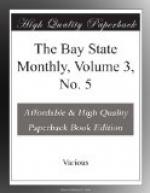But that morning speech, evidently, was not easy to her. For, although she had gone to him as a matter of course, her perplexity seemed to grow greater as she sat down by the desk at which he was making up some accounts. It seemed to her that her life was no longer free and simple; a dreadful force had come into contact with it and, as she felt, made it more unworthy. Had a mere jest ever before brought such a train of miseries? Her fingers laid restless folds in a piece of paper she took up, and her father after his greeting went on with the accounts. It was his habit to give people time, and he had found that doing it gave him the best opportunity to take his own bearings. His judgments were usually so accurate, and his decisions so wise that a good many people would have been thankful to find the scales by which he weighed the anxiety or the satisfaction that came under his observation. On that morning the rapid pen travelled several times up and down columns of figures and noted down the results before Elizabeth began:
“Father.” It was a small beginning, and followed by silence. But the tone made Mr. Royal push his work aside, and look full into his daughter’s face. “Father,” she repeated, “I want you to advise me.”
“Am I not always ready for that?” returned Mr. Royal, his smile fading before the gravity of her expression.
“There is something so hard to be done,” she answered.
“Then, must it be done?”
“Oh, yes, that’s the only thing about it I am quite sure of. It must be done, and directly, too. It may be too late now, but we must try. What troubles me is how it can be done so that we may be certain.”
“Certain of what?”
“Certain that it reaches him,” answered Elizabeth. Then she looked at her father, and remembered that he could not understand her. “I must tell you,” she said. “It is like a nightmare. It oppresses me to think of it. I feel guilty to believe it, and yet I don’t dare to deny it to myself, for fear of the consequences. It’s about Mr. Edmonson, father.”
“Oh!” said her listener in a tone far from pleased.
“And Mr. Archdale, added Elizabeth. Not that who the people are makes any difference. Our duties would be just the same knowing the,—knowing what I do.” Her father sat watching her in silence with his keenest gaze. “There is no love lost between the two men, as you know,” she went on. “Mr. Archdale is lofty, and wouldn’t condescend to anything more than a dislike that he hasn’t tried to conceal, since Mr. Edmonson ceased being his guest. But with Mr. Edmonson it’s different; when he feels, he acts; and once in a while there is an unrestraint about him which is frightful; it makes me think of lava breaking through the crust of a volcano. I believe there is something volcanic in his nature; you can’t go deep into it without danger. And there is danger now. Father, there is danger now.” As Elizabeth repeated her statement she leaned forward a little and looked at her father, her eyes full of earnestness and dread.




